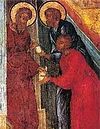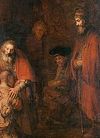

| Previous day | Next day |
| Old Style
February 15
|
Sunday |
New Style
February 28
|
| Sunday of the Prodigal Son. Tone 5. | No fast.
|
![]() Apostle Onesimus of the Seventy (ca. 109).
Apostle Onesimus of the Seventy (ca. 109).
St. Paphnutius, monk, and his daughter St. Euphrosyne, nun, of Alexandria (5th c.). St. Eusebius, hermit, of Asikha in Syria (5th c.). St. Paphnutius, recluse of the Kiev Caves (13th c.).
Synaxis of St. John the Theologian at Diaconissa. Martyr Major of Gaza (304). St. Theognius, bishop of Bethelia near Gaza (523). St. Oswy, king of Northumbria (670). New Hieromartyr Paul (Kozlov), hieromonk of St. Nilus Hermitage (Tver) (1938).
Repose of Blessed Stoina (Euphemia) of Devic Monastery (Serbia) (1895), Schemamonk Nikodim of Karoulia (1984), and Monk Marcu (Dumitrescu) of Sihastria (Romania) (1999).
Thoughts for Each Day of the Year
According to the Daily Church Readings from the Word of God
By St. Theophan the Recluse

Sunday of the Prodigal Son (34th). [I Cor. 6:12–20; Luke 15:11–32]
The week of the prodigal speaks of so much to us! It speaks about our peace and satisfaction in the house of the heavenly Father, about our mad departure from the Father’s guardianship to unbridled freedom, about the richness of the heritage given us despite our disobedience, about its reckless waste on all sorts of indecencies, and about our utter impoverishment as a result. But then it talks also about how one recovers his senses, and, coming to himself, decides to return to his greatly merciful Father. It talks about how he returns, how he is received lovingly, and is restored to his first state. Who will not find this lesson profitable? If you abide in your father’s house, do not strive for freedom. You see how a similar experience ended! If you have run away and are squandering all, end this quickly. If you have already squandered everything and are living in poverty, decide quickly to return—and then, return. There every indulgence, and all the former love and satisfaction, await you. This last step is the most necessary one. But there is no point in enlarging upon this. All has been said concisely and clearly. Come to your senses, decide to return, arise and hurry to the Father. His embrace is open and ready to receive you.
Articles
 Apostle Onesimus of the SeventySaint Onesimus, Apostle of the Seventy in his youth was a servant of Philemon, a Christian of distinguished lineage, living in the city of Colossae, Phrygia. |
 Venerable Paphnutius of AlexandriaThe Holy Martyr Paphnutius hailed from Egypt and struggled in the desert. |
 Venerable Eusebius the Hermit of SyriaSaint Eusebius the Hermit lived in the fourth century and lived in asceticism on a mountain near the village of Asicha in Syria. |
 Venerable Paphnutius the Recluse of the Kiev CavesSaint Paphnutius had the gift of tears, which Saint John of the Ladder says (Step 6:1) is preceded by the remembrance of death. |







